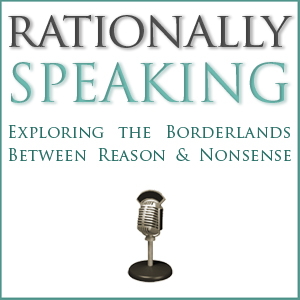Rationally Speaking #57 - Peer Review
Rationally Speaking Podcast
New York City Skeptics
4.6 • 787 Ratings
🗓️ 25 March 2012
⏱️ 48 minutes
🧾️ Download transcript
Summary
Transcript
Click on a timestamp to play from that location
| 0:00.0 | Rationally Speaking is a presentation of New York City skeptics dedicated to promoting critical thinking, skeptical inquiry, and science education. |
| 0:22.6 | For more information, please visit us at NYCCEceptics.org. |
| 0:35.7 | Welcome to Rationally Speaking, the podcast where we explore the borderlines between reason |
| 0:39.9 | and nonsense. I am your host, Massimo Piliucci. And with me as always, is my co-host, Julia Galev. |
| 0:45.7 | Julia, what are we going to talk about today? |
| 0:48.0 | Massimo, our topic today is the peer review process, the process by which papers get |
| 0:52.8 | approved for academic publication, it's pretty |
| 0:55.9 | much a black box to most people. So we're going to try to demystify it a bit and talk about some of the |
| 1:01.4 | potential problems with it and ways that that impacts the development of science. And also some of the |
| 1:08.0 | ways that the peer review process is changing or being undermined in the the new era of online science yeah so so should we start with the basic outline |
| 1:16.0 | of the way it usually works yeah why don't why don't you give that outline because I'm sure |
| 1:20.0 | you're more directly familiar with it than I am yeah I'd say a little too much familiar you know |
| 1:24.4 | as an author has a reviewer, and as an editor, actually. |
| 1:29.5 | So I've done all three the major roles. And the process is really pretty straightforward, |
| 1:35.1 | at least in the basic idea. So you are an author of a scholarly paper, and no matter what |
| 1:41.2 | the discipline is, be science, philosophy, you know, English literature, |
| 1:44.7 | whatever, you submit, you read up your paper, of course, in a certain style, which it's usually |
| 1:49.5 | pretty well established within a particular discipline. So in some, most science papers, for instance, |
| 1:55.0 | have a canonical structure. They start out with an introduction. They continue with the materials |
| 2:00.1 | and methods so that people know what you actually did in practice and how to replicate it if they want to. |
| 2:06.5 | There's a results section when you actually present the data and then finally a discussion |
| 2:10.7 | when you tell the people why this all thing is relevant and what it means. |
... |
Please login to see the full transcript.
Disclaimer: The podcast and artwork embedded on this page are from New York City Skeptics, and are the property of its owner and not affiliated with or endorsed by Tapesearch.
Generated transcripts are the property of New York City Skeptics and are distributed freely under the Fair Use doctrine. Transcripts generated by Tapesearch are not guaranteed to be accurate.
Copyright © Tapesearch 2025.

